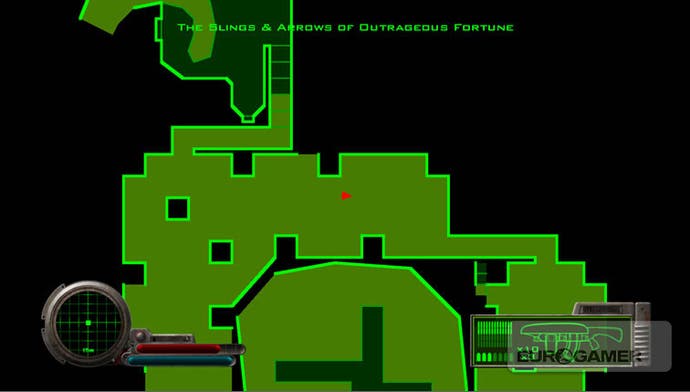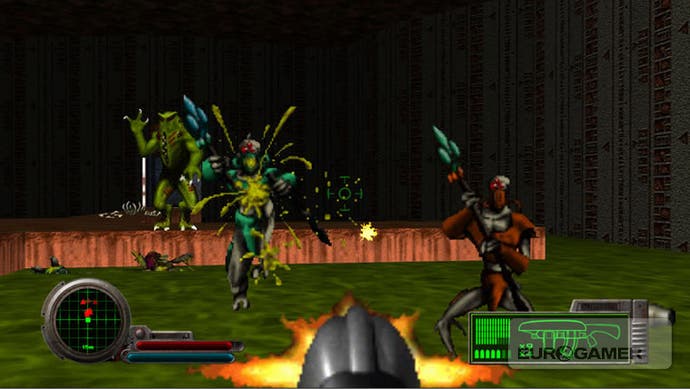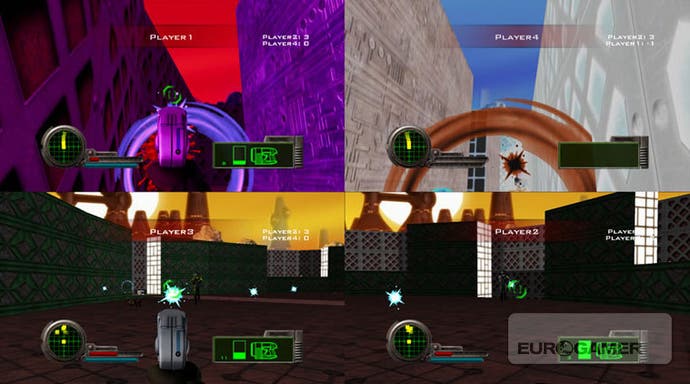Marathon - Durandal
Snickers never happened.
And now it's Bungie's turn to wallow in some timely nostalgia, as we turn the clock back almost 12 years to a time when 3D accelerators had barely left the drawing board. Those happy, expensive days...
The wallet-draining mid-'90s was definitely a good time to be paying close attention to the genesis of first-person shooters; every new game seemed to build on the one before in an interesting way, and an awful lot of the innovations we now take for granted were still very much up for grabs.
At the time, the relatively unknown Bungie studio was content to plough a lonely furrow on the Macintosh - tantamount to commercial suicide at a time when the PC was fully in its stride as the cutting edge gaming platform of choice. Still, it didn't hurt them in the long run, did it?
Fill that gaping knowledge gap
Given the impact Halo had subsequently, it still feels a bit wrong to have missed out on a large body of the company's work - like coming to a band six albums down the line. But there are mitigating circumstances. For a start, most committed PC gamers at the time, like me, were far too entranced by Doom 2, Quake, Rise of the Triad, Dark Forces, Duke Nukem 3D, Descent and System Shock to notice that there was another equally interesting shooter series emerging on another even more improbably expensive platform.

The other factor for Marathon's relative obscurity was that Mac gaming in most parts of the world got zero air-time whatsoever - few specialist gaming stores even bothered to sell Mac games - and still don't. By the time the belated Windows 95 port came out for Marathon: Durandal, it was old news and its impact was all but lost in mainstream terms.
But by the magic of Xbox Live Arcade, the second game in the revered Marathon trilogy now has another chance to show all of us PC heads what we were missing (that's if you never got around to downloading it for free a few years back). Placed in the context of when it came out (November 1995), it's easy to see that it was one of the few to attempt a coherent plot, and some of the technical innovations were neat for the time, but it's not so easy to unpick why the game was any better or more important than the games listed above.
Be patient
It all kicks off 17 years after the events of the original - you're sent in alongside an army of ex-colonists to search the ruins of Lh'owon by Durandal, an AI being. Unlike practically every FPS out at the time, Bungie's focus appears to be less about killing everything in sight to proceed through each level, and more about patient exploration and finding out what each level demands from you. To do this, you have to pay close attention to the various information terminals dotted around the map. Sometimes you're just dumped a big segment of narrative (usually full of unpronounceable names, unhelpfully), and other time given a concise overview of a switch to seek out, or task to perform. It's pretty basic stuff, in truth, but it definitely helps give you a sense of purpose and place, rather than merely wandering around shooting things.

The main problem with the game, in 2007, is that it takes an age to truly get your bearings in any of the game's labyrinthine levels. You might well have a handle on roughly what you're supposed to do, but the samey-looking nature of the simplistic design means it can take a long time before you stop wandering around in circles. Back in 1995, game designers hadn't really figured out that it wasn't much fun being lost, and as such Marathon: Durandal quite quickly becomes a bit of a slog to play through more than a handful of its 30 or so levels.
As atmospheric as it must have felt at the time, it only goes a small way towards excusing what was, and is, quite wretched combat. The AI is practically non-existent, with enemies standing around gormlessly, waiting for you to pick them off one by one. Next to the seminal Doom 2, it can't even hold a candle to id's classic in this respect - even if it does boast some neat innovations like dual-wielding, and the ability to swim through liquid.
Moan, whinge, whine
There are a bunch of minor complaints that don't help endear you to the game, either - like starting a new level with the health you left the last one with. Not only is this fairly annoying, it makes further progress extremely tough if you're low on health - often resulting in a lengthy backtrack as you reload a previously saved game and repeat an entire section simply to stand a chance of getting anywhere with the next level. Another common moan is that it's one of the worst games for inspiring motion sickness - although it's not something that affected us - and in any case, camera bob is turned off by default, so it really shouldn't be an issue for many people.

On a personal level, as nice as it is in theory to have a slightly more involved plot-line and sense of purpose, the game still inevitably resorts to getting players to push switches to progress. It's not as revolutionary as the passionate fan-base would have you believe - give us Duke 3D any day of the week (please, 3D Realms - you know it makes sense).
On the other hand, if you played and enjoyed Marathon at the time, then you'll be in for a treat. The game's art has been entirely cleaned up to enhance it for HD displays, the HUD has been tweaked to ensure it takes up less of the screen, the game now runs at 60 frames-per-second instead of 30, and the whole shebang now takes full advantage of widescreen displays. In terms of giving fans the ultimate version, you can't fault it whatsoever.
Survival horror
On top of that, there's a brand new score-based single-player 'Survival' mode, where you have to see how long you can last against wave upon wave of enemies, as well as all the online modes that you'll remember from the old days. In addition to the standard 'Every Man for Himself' Deathmatch, there's Kill the Guy with the Ball (the skull, more accurately), King of the Hill, Tag, Team Play (Team Deathmatch), and Co-op for up to eight players. Although most of these now feel exceptionally old-school, they still have a certain charm about them and give gaming historians the chance to see how some of Halo's multiplayer ideas were first implemented.
All told, Marathon: Durandal offers an intriguing insight into Bungie's early days, and for the sake of 800 points it's well worth checking out. That said, despite being ahead of Doom 2 in many respects, it's simply nowhere near as fun to play. Saddled with clunky combat, it's impossible to come to this with fresh eyes and appreciate what the fuss was about. If you're a die-hard fan, though, this will be an irresistible purchase, with real care and attention lavished on taking full advantage of what Xbox Live Arcade has to offer. Either way, try before you buy - it may be Bungie, but that's no guarantee you'll like it.


